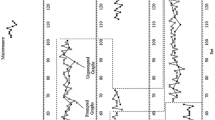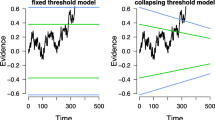Abstract
A recent study (Crosbie & Kelly, 1994) showed that brief externally imposed postfeedback delays improved performance in computerized programmed instruction. The present experiment extended that analysis by using shorter sessions, a more powerful single-subject design, and better timing measures, and by assessing maintenance of training effects. College students completed 40 sets of Holland and Skinner’s (1961) programmed text on behavior analysis in a computerized format in a two-component multiple schedule. In the components there was either no postfeedback delay or a 10-s postfeedback delay for each question. On average, delay improved performance by 7% during training, and this advantage was maintained and increased at both posttest (13%) and follow-up (17%). Subjects were satisfied with delay, and session time increased only slightly. Present results show that subjects work faster and more accurately, and have better maintenance when their pace is externally imposed rather than self-selected.
Similar content being viewed by others
References
ANDERSON, R. C., KULHAVY, R. W., & ANDRE, T. (1971). FEEDBACK PROCEDURES IN PROGRAMMED INSTRUCTION. Journal of Educational Psychology, 62, 148–156.
AZRIN, N. H., & HOLZ, W. C. (1966). PUNISHMENT. In W. K. Honig (Ed.), Operant behavior: Areas of research and application (pp. 380–447). Englewood Cliffs, NJ: Prentice Hall.
BOEHM, B. W., SEVEN, M. J., & WATSON, R. A. (1971). INTERACTIVE PROBLEM-SOLVING–AN EXPERIMENTAL STUDY OF “LOCKOUT” EFFECTS. AFIPS Conference Proceedings, 38, 205–210.
BOURNE, L. E., Jr. (1957). EFFECTS OF DELAY OF INFORMATION FEEDBACK AND TASK COMPLEXITY OF THE IDENTIFICATION OF CONCEPTS. Journal of Experimental Psychology, 54, 201–207.
BOURNE, L. E., Jr., & BUNDERSON, C. V. (1963). EFFECTS OF DELAY OF INFORMATIVE FEEDBACK AND LENGTH OF POSTFEEDBACK INTERVAL ON CONCEPT IDENTIFICATION. Journal of Experimental Psychology, 65, 1–5.
BOURNE, L. E., Jr., GUY, D. E., DODD, D. H., & JUSTESEN, D. R. (1965). CONCEPT IDENTIFICATION: THE EFFECTS OF VARYING LENGTH AND INFORMATIONAL COMPONENTS OF THE INTERTRIAL INTERVAL. Journal of Experimental Psychology, 69, 624–629.
CROSBIE, J., & KELLY, G. (1994). EFFECTS OF IMPOSED POSTFEEDBACK DELAYS IN PROGRAMMED INSTRUCTION. Journal of Applied Behavior Analysis, 27, 483–491.
DANNENBRING, G. L. (1983). THE EFFECT OF COMPUTER RESPONSE TIME ON USER PERFORMANCE AND SATISFACTION: A PRELIMINARY INVESTIGATION. Behavior Research Methods & Instrumentation, 15, 213–216.
EDGINGTON, E. S. (1982). NON-PARAMETRIC TESTS FOR SINGLE-SUBJECT MULTIPLE SCHEDULE EXPERIMENTS. Behavioral Assessment, 4, 83–91.
HATIVA, N., SARIG, O., & LESGOLD, A. (1991). TIMING STUDENT’S ANSWERS IN CAI. Journal of Computer-Based Instruction, 18, 19–29.
HOLLAND, J. G., & PORTER, D. (1961). THE INFLUENCE OF REPETITION OF INCORRECTLY ANSWERED ITEMS IN A TEACHING MACHINE PROGRAM. Journal of the Experimental Analysis of Behavior, 4, 305–307.
HOLLAND, J. G., & SKINNER, B. F. (1961). The analysis of behavior. New York: McGraw-Hill.
JOHNSON, K. R., & RUSKIN, R. S. (1977). Behavioral instruction: An evaluative review. Washington, DC: American Psychological Association.
KELLER, F. S. (1968). “GOOD-BYE, TEACHER …”. Journal of Applied Behavior Analysis, 1, 79–89.
KULIK, C-L. C., & KULIK, J. A. (1991). EFFECTIVENESS OF COMPUTER-BASED INSTRUCTION: AN UPDATED ANALYSIS. Computers in Human Behavior, 7, 75–94.
KULIK, J. A., COHEN P. A., & EBELING, B. J. (1980). EFFECTIVENESS OF PROGRAMMED INSTRUCTION IN HIGHER EDUCATION: A META-ANALYSIS OF FINDINGS. Educational Evaluation and Policy Analysis, 2, 51–64.
KULIK, J. A., JAKSA, P., & KULIK, C-L. C. (1978). RESEARCH ON COMPONENT FEATURES OF KELLER’S PERSONALIZED SYSTEM OF INSTRUCTION. Journal of Personalized Instruction, 3, 2–14.
NIEMIEC, R., & WALBERG, H. J. (1987). COMPARATIVE EFFECTS OF COMPUTER-ASSISTED INSTRUCTION: A SYNTHESIS OF REVIEWS. Journal of Educational Computing Research, 3, 19–37.
SALMONI, A. W., SCHMIDT, R. A., & WALTER, C. B. (1984). KNOWLEDGE OF RESULTS AND MOTOR LEARNING: A REVIEW AND CRITICAL REAPPRAISAL. Psychological Bulletin, 95, 355–386.
SHERMAN, J. G., & RUSKIN, R. S. (1978). The Personalized System of Instruction. Englewood Cliffs, NJ: Educational Technology Publications.
SIEGEL, S. (1956). Nonparametric statistics for the behavioral sciences. Tokyo: McGraw-Hill Kogakusha.
SKINNER, B. F. (1954). THE SCIENCE OF LEARNING AND THE ART OF TEACHING. Harvard Educational Review, 24, 86–97.
SKINNER, B. F. (1968). The technology of teaching. New York: Appleton-Century-Crofts.
STOKES, M T., HALCOMB, C. G., & SLOVACEK, C. P. (1988). DELAYING USER RESPONSES TO COMPUTER-MEDIATED ITEMS ENHANCES TEST PERFORMANCE. Journal of Computer-Based Instruction, 15, 99–103.
TOBIAS, S. (1973). REVIEW OF THE RESPONSE MODE ISSUE. Review of Educational Research, 43, 193–204.
WHITE, R. M., & SCHMIDT, S. W. (1972). PRERESPONSE INTERVALS VERSUS POSTINFORMATIVE FEEDBACK INTERVALS IN CONCEPT IDENTIFICATION. Journal of Experimental Psychology, 94, 350–352.
Author information
Authors and Affiliations
Corresponding author
Additional information
This experiment was part of Glenn Kelly’s doctoral dissertation at Deakin University and was supported by grants from Deakin University’s internal research grants. We are grateful to John Hinchy for providing helpful comments on an earlier version of this paper
Rights and permissions
About this article
Cite this article
Kelly, G., Crosbie, J. Immediate and Delayed Effects of Imposed Postfeedback Delays in Computerized Programmed Instruction. Psychol Rec 47, 687–698 (1997). https://doi.org/10.1007/BF03395253
Published:
Issue Date:
DOI: https://doi.org/10.1007/BF03395253




